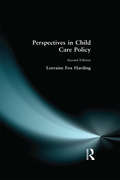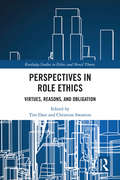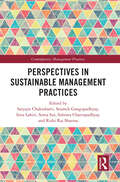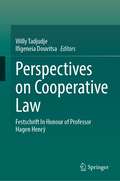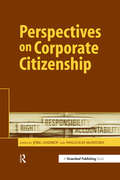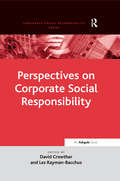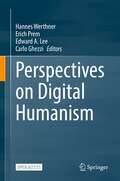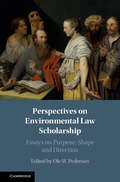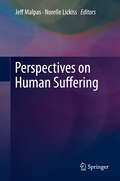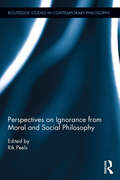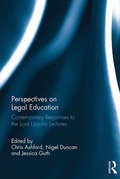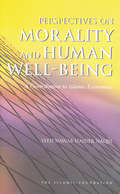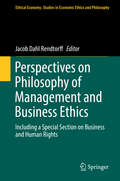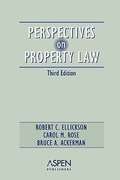- Table View
- List View
Persons, Rights, and the Moral Community
by Loren E. LomaskyThis book provides a complete and convincing account of what rights we do and do not have, who has them, and why. Presenting the foundations of a liberal, individualistic theory of rights, Lomasky explains the place of rights within the overall structure of morality, arguing for the moral importance of individual commitments to and pursuit of "projects."
Perspective
by Charles RembarSixteen essays about the First Amendment from the man who changed the way America reads literature A lawyer, literary agent, and author, Charles Rembar never stopped fighting against the puritanical laws that prevented Americans from consuming controversial art. These so-called anti-obscenity laws prevented the sale and distribution of books that, at the time, were considered racy, salacious, or downright pornographic. During a time of great political and cultural upheaval, Rembar was instrumental in ushering in a significant change in how America views literature, and in maintaining the importance of our First Amendment rights. Perspective collects sixteen essays written between 1967 and 1974, each primarily concerned with the "scope and meaning" of the First Amendment. Divided into three sections, Perspective offers insight into the major "constitutional crises" of the time: freedom of expression, the right to a fair trial, and impeachment. Miles away from dry legalese, Rembar's conversational, often humorous style makes this collection as enjoyable as it is informative. His thought-provoking essays--whether about the Watergate hearings, the trial of Dr. Spock, Bobby Seale's imprisonment, or literary and artistic freedom--have never been more relevant than they are today.
Perspectives On Conservation: Essays on America's Natural Resources (RFF Natural Resource Management Set)
by Henry JarrettA collection of papers based on those prepared by authorities who participated in the 1958 RFF forum, including contributions by Samuel Hays and John Kenneth Galbraith. Originally published in 1958
Perspectives in Child Care Policy
by Lorraine Fox HardingChild care law and policy issues generate very strong emotions and some crucial questions concerning the role of the state. For instance, under what circumstances should the state be able to intervene and use the force of the law to protect children? Do children have similar rights to adults? Such questions are matters of controversial debate and, in the light of well publicised child abuse cases, official inquiries and a government review led to the passing of the Children Act in 1989.Perspectives in Child Care Policy presents four different value perspectives on child care policy - laissez-faire; state paternalism; defence of the birth family and children's rights. These perspectives differ in their underlying values, concepts and assumptions concerning children, families, the rights and powers of parents and the role of the state.
Perspectives in Company Law and Financial Regulation
by Michel Tison Hans De Wulf Christoph Van Der Elst Reinhard SteennotThis collection of essays has been compiled in honour of Professor Eddy Wymeersch on the occasion of his retirement as professor at Ghent University. His main international academic peers explore developments on the crossroads of company law and financial regulation in Europe and the United States, providing a unique view on the dynamics of regulatory competition in an era of economic globalisation, whether in the fields of rulemaking, organising the mobility of capital or the enforcement of rules. The deepening of European financial integration and the transatlantic regulatory dialogue has generated new paradigms of rule-setting in a multinational framework and reinforced the need to develop adequate instruments for co-operation between regulators. Regulators increasingly use concepts such as equivalence or mutual recognition to regulate cross-border relations.
Perspectives in Role Ethics: Virtues, Reasons, and Obligation (Routledge Studies in Ethics and Moral Theory)
by Tim Dare Christine SwantonAlthough our moral lives would be unrecognisable without them, roles have received little attention from analytic moral philosophers. Roles are central to our lives and to our engagement with one another, and should be analysed in connection with our core notions of ethics such as virtue, reason, and obligation. This volume aims to redress the neglect of role ethics by confronting the tensions between conceptions of impartial morality and role obligations in the history of analytic philosophy and the Confucian tradition. Different perspectives on the ethical significance of roles can be found by looking to debates within professional and applied ethics, by challenging existing accounts of how roles generate reasons, by questioning the hegemony of ethical reasons, and by exploring the relation between expertise and virtue. The essays tackle several core questions related to these debates: What are roles and what is their normative import? To what extent are roles and the ethics of roles central to ethics as opposed to virtue in general, and obligation in general? Are role obligations characteristically incompatible with ordinary morality in professions such as business, law, and medicine? How does practical reason function in relation to roles? Perspectives in Role Ethics is an examination of a largely neglected topic in ethics. It will appeal to a broad range of scholars in normative ethics, virtue ethics, non-Western ethics, and applied ethics interested in the importance of roles in our moral life.
Perspectives in Sustainable Management Practices (Contemporary Management Practices)
by Satyajit Chakrabarti, Soumik Gangopadhyay, Isita Lahiri, Soma Sur, Subrata Chattopadhyay and Rishi Raj SharmaEmbracing sustainable management practices is important for businesses and commercial organizations wishing to responsibly contribute to the socioeconomic development of societies and communities. This book provides insights into recent trends, issues, and challenges in embracing these practices, while promoting growth and innovation in business. The COVID-19 pandemic has redefined the necessity of implementing sustainable practices. This book looks at the process, implementation, and evaluation of sustainable practices in the social and commercial sectors in recent years. With case studies from different industries, these chapters explore and document creative applications of effective measures to chart out financial growth for businesses while reducing carbon emissions, focusing on corporate social responsibility, and working toward socio-economic sustainability for workers and communities, among others. They also examine how these innovative strategies can be scaled up and applied across diverse industries, for small and large businesses, and in different economic environments. Part of the Contemporary Management Practices series, this book will be useful to practising managers, researchers, and students who are interested in business strategy, financial strategy, and social inclusion. It will be especially of use to those working in the areas of corporate governance, corporate social responsibility, green marketing, corporate finance, and organizational performance.
Perspectives on Commercializing Innovation
by F. Scott Kieff Troy A. ParedesIntellectual property is a vital part of the global economy, accounting for about half of the GDP in countries like the United States. Innovation, competition, economic growth and jobs can all be helped or hurt by different approaches to this key asset class, where seemingly slight changes in the rules of the game can have remarkable impact. This book brings together diverse perspectives from the fields of law, economics, business and political science to explore the ways varying approaches to intellectual property can positively and negatively impact our economy and society. Employing approaches that are both theoretically rigorous and grounded in the real world, Perspectives on Commercializing Innovation is well suited for practising lawyers, managers, lawmakers and analysts, as well as academics conducting research or teaching in a range of courses in law schools, business schools and economics departments, at either the undergraduate or graduate level.
Perspectives on Cooperative Law: Festschrift In Honour of Professor Hagen Henrÿ
by Willy Tadjudje Ifigeneia DouvitsaThis book contributes to the development of literature on cooperative law while paying tribute to Hagen Henrÿ’s significant impact on this field at a global scale. Hagen Henrÿ is one of the most influential scholars in the field of cooperative law. His primary contribution has been in the area of public international cooperative law. His other areas of scientific interest include development law and comparative law. This honorary volume is focused on two main axes -- the essence of cooperatives as well as their activities and their governance. The contributions throw light on how these two axes are addressed by cooperative legislation across countries, regions and continents. In the varied perspectives that the contributions put together, both a theoretical and practical approach, the authors address central, current and crucial issues for the development of cooperative law. The book is a great resource for researcher scholars, as well as policy makers and industry players interested in the topic.
Perspectives on Corporate Citizenship
by Malcolm McIntosh Jörg AndriofA number of disparate but interconnected forces such as deregulation and globalization, rapid advances in communications technology and the rise in the power of the consumer and civil society have now combined to bring corporate responsibility to prominence in many corporate boardrooms. In this information age, the ramifications of not addressing best practice in environment, workplace, marketplace and community could range from bad press coverage to complete market exclusion. These are perilous times for the social construct of modern capitalism.In today's society successful companies will increasingly be those that recognize that they have responsibilities to a range of stakeholders that go beyond compliance with the law. If in the past the focus was on enhancing shareholder value, now it is on engaging stakeholders for long-term value creation. This does not mean that shareholders are not important, or that profitability is not vital to business success, but that in order to survive and be profitable a company must engage with a range of stakeholders whose views may vary greatly. If in the past corporate social responsibility was simply seen as profitability plus compliance plus philanthropy, now responsible corporate citizenship means companies being more aware of and understanding the societies in which they operate. This means senior executives and managers being able to deal with a wide range of issues including greater accountability, human rights abuses, sustainability strategies, corporate governance codes, workplace ethics, stakeholder consultation and management.The aim and scope of Perspectives on Corporate Citizenship is to help capture and distil these and other emerging trends in terms of content, context and processes, in one concise volume. With contributions from the *crème de la crème* of leading thinkers from around the world, Perspectives on Corporate Citizenship is essential reading for students, scholars and all serious thinkers on one of the most critical issues of our time.
Perspectives on Corporate Governance
by F. Scott Kieff Troy A. ParedesThe events that began with the collapse of Enron, WorldCom, Tyco, and Adelphia and continued into the financial crisis of 2008 teach us an important lesson: corporate governance matters. But although it is now widely acknowledged that good corporate governance is a linchpin of good corporate performance, a significant debate remains over exactly how to improve corporate governance and its impact on corporate and overall economic performance. This book offers a uniquely diverse and forward-looking set of approaches from leading experts, covering the major areas of corporate governance reform and analysing the full range of issues and concerns. This volume offers a host of innovative and original suggestions on how corporate governance can continue to improve. Written to be both theoretically rigorous and grounded in the real world, the book is well suited for practising lawyers, managers, lawmakers, and analysts, as well as academics conducting research or teaching a wide range of courses in law schools, business schools, and economics departments.
Perspectives on Corporate Social Responsibility (Corporate Social Responsibility Series)
by Lez Rayman-BacchusOver the last decade the question of the relationship between organizations and society has been subject to much debate, often of a critical nature. The decade has seen protests concerning the actions of organizations, exposures of corporate exploitation and unfolding accounting scandals. At the same time ethical behaviour and a concern for the environment have been shown to have a positive correlation with corporate performance. The nature of corporate social responsibility is therefore a topical one for businesses and academics. There are, however, many different perspectives upon what is meant by corporate social responsibility and how this might be applied within organizations. The authors involved are respected academics from a variety of disciplines from around the world. The contributions to this book investigate theoretical perspectives on the topic, the application in practice of socially responsible behaviour and the ethical dimension of such behaviour.
Perspectives on Digital Humanism
by Hannes Werthner Carlo Ghezzi Edward A. Lee Erich PremThis open access book aims to set an agenda for research and action in the field of Digital Humanism through short essays written by selected thinkers from a variety of disciplines, including computer science, philosophy, education, law, economics, history, anthropology, political science, and sociology. This initiative emerged from the Vienna Manifesto on Digital Humanism and the associated lecture series. Digital Humanism deals with the complex relationships between people and machines in digital times. It acknowledges the potential of information technology. At the same time, it points to societal threats such as privacy violations and ethical concerns around artificial intelligence, automation and loss of jobs, ongoing monopolization on the Web, and sovereignty. Digital Humanism aims to address these topics with a sense of urgency but with a constructive mindset. The book argues for a Digital Humanism that analyses and, most importantly, influences the complex interplay of technology and humankind toward a better society and life while fully respecting universal human rights. It is a call to shaping technologies in accordance with human values and needs.
Perspectives on Environmental Law Scholarship: Essays on Purpose, Shape and Direction
by Ole W. PedersenThis collection invites environmental law scholars to reflect on what it means to be an environmental law scholar and to consider how and why environmental law scholars engage in environmental law scholarship. Leading environmental law scholars from different backgrounds and jurisdictions offer their personal reflections on the nature, form, quality and challenges of environmental law scholarship. The collection offers the first honest introspection on what environmental law scholarship is and is not. It considers the unique contributions of environmental law scholarship to legal scholarship more generally, reflecting on what sets environmental law scholarship apart from other disciplines of legal scholarship and the challenges arising from these differences.
Perspectives on Essential Health Benefits
by Board on Health Care Services Institue Of Medicine Committee on Defining REvising an Essential Health Benefits Package for Qualified Health PlansThe Patient Protection and Affordable Care Act (herein known as the Affordable Care Act [ACA]) was signed into law on March 23, 2010. Several provisions of the law went into effect in 2010 (including requirements to cover children up to age 26 and to prohibit insurance companies from denying coverage based on preexisting conditions for children). Other provisions will go into effect during 2014, including the requirement for all individuals to purchase health insurance. In 2014, insurance purchasers will be allowed, but not obliged, to buy their coverage through newly established health insurance exchanges (HIEs)--marketplaces designed to make it easier for customers to comparison shop among plans and for low and moderate income individuals to obtain public subsidies to purchase private health insurance. The exchanges will offer a choice of private health plans, and all plans must include a standard core set of covered benefits, called essential health benefits (EHBs). The Department of Health and Human Services requested that the Institute of Medicine (IOM) recommend criteria and methods for determining and updating the EHBs. In response, the IOM convened two workshops in 2011 where experts from federal and state government, as well as employers, insurers, providers, consumers, and health care researchers were asked to identify current methods for determining medical necessity, and share decision-making approaches to determining which benefits would be covered and other benefit design practices. Essential Health Benefits summarizes the presentations in this workshop. The committee's recommendations will be released in a subsequent report.
Perspectives on Financing Innovation (Routledge/C-LEAF Studies in Economic and Financial Law)
by F. Scott Kieff James E. Daily Arthur E. WilmarthAlthough much has been written about innovation in the past several years, not all parts of the innovation lifecycle have been given the same treatment. This volume focuses on the important first step of arranging financing for innovation before it is made, and explores the feedback effect that innovation can have on finance itself. The book brings together a diverse group of leading scholars in order to address the financing of innovation. The chapters address three key areas, intellectual property, venture capital, and financial engineering in the capital markets, in order to provide fresh and insightful analyses of current and future economic developments in financing innovation. Chapters on intellectual property cover topics including innovation in law-making, orphan business models, and the use of intellectual property to protect financial engineering innovations and developing intellectual property regimes in Brazil, Russia, India, and China. The book also covers the tax treatment of venture capital founders, the treatment of preferred stock by the Delaware Courts, asset-backed lending hedge funds, and corporate governance for small businesses after the Dodd-Frank financial reform bill. The book will be of interest to scholars, practitioners, and students in law, innovation, finance, and business.
Perspectives on Human Suffering
by Jeff Malpas Norelle LickissThis volume brings together a range of interdisciplinary perspectives on a topic of central importance, but which has otherwise tended to be approached from within just one or another disciplinary framework. Most of the essays contained here incorporate some degree of interdisciplinarity in their own approach, but the volume nevertheless divides into three main sections: Philosophical considerations; Humanities approaches; Legal, medical, and therapeutic contexts. The volume includes essays by philosophers, medical practitioners and researchers, historians, lawyers, literary, Classical, and Judaic scholars. The essays are united by a common concern with the question of the human character of suffering, and the demands that suffering, and the recognition of suffering, make upon us.
Perspectives on Ignorance from Moral and Social Philosophy (Routledge Studies in Contemporary Philosophy)
by Rik PeelsThis edited collection focuses on the moral and social dimensions of ignorance—an undertheorized category in analytic philosophy. Contributors address such issues as the relation between ignorance and deception, ignorance as a moral excuse, ignorance as a legal excuse, and the relation between ignorance and moral character. In the moral realm, ignorance is sometimes considered as an excuse; some specific kind of ignorance seems to be implied by a moral character; and ignorance is closely related to moral risk. Ignorance has certain social dimensions as well: it has been claimed to be the engine of science; it seems to be entailed by privacy and secrecy; and it is widely thought to constitute a legal excuse in certain circumstances. Together, these contributions provide a sustained inquiry into the nature of ignorance and the pivotal role it plays in the moral and social domains.
Perspectives on Industrial Ecology
by Suren Erkman Dominique Bourg President Jacques ChiracBusiness-as-usual in terms of industrial and technological development – even if based on a growing fear of pollution and shortages of natural resources – will never deliver sustainable development. However, the growing interest in recent years in the new science of industrial ecology (IE), and the idea that industrial systems should mimic the quasi-cyclical functions of natural ecosystems in an 'industrial food chain', holds promise in addressing not only short-term environmental problems but also the long-term holistic evolution of industrial systems. This possibility requires a number of key conditions to be met, not least the restructuring of our manufacturing and consumer society to reduce the effects of material and energy flows at the very point in history when globalisation is rapidly increasing them. This book sets out to address the theoretical considerations that should be made implicit in future research as well as practical implementation options for industry. The systematic recovery of industrial wastes, the minimisation of losses caused by dispersion, the dematerialisation of the economy, the requirement to decrease our reliance on fuels derived from hydrocarbons and the need for management systems that help foster inter-industry collaboration and networks are among the topics covered. The book is split into four sections. First, the various definitions of IE are outlined. Here, important distinctions are made between industrial metabolism and IE. Second, a number of different industrial sectors, including glass, petroleum and electric power, are assessed with regard to the operationalisation of industrial ecology. Eco-industrial Parks and Networks are also analysed. Third, the options for overcoming obstacles that stand in the way of the closing of cycles such as the separation and screening of materials are considered and, finally, a number of implications for the future are assessed. The contributions to Perspectives on Industrial Ecology come from the leading thinkers working in this field at the crossroads between a number of different disciplines: engineering, ecology, bio-economics, geography, the social sciences and law.
Perspectives on Justice, Indigeneity, Gender, and Security in Human Rights Research
by Katerina Standish Laura E. ReimerThis book is a compendium of emergent global Human Rights Scholarship offering current ruminations on justice, indigeneity, gender, security, and human rights. This edited collection examines Access to Justice, Allyship and Equality, Human Rights and Social Justice, the Rights of Indigenous People, Indigenous Rights and the University, Transgender Healthcare, Femicide, Women Workers, Extremism and Misogyny, Human Rights and Aging, cyberwarfare, climate change.
Perspectives on Legal Education: Contemporary Responses to the Lord Upjohn Lectures
by Chris Ashford Nigel Duncan Jessica GuthThis edited collection offers a critical overview of the major debates in legal education set in the context of the Lord Upjohn Lectures, the annual event that draws together legal educators and professionals in the United Kingdom to consider the major debates and changes in the field. Presented in a unique format that reproduces classic lectures alongside contemporary responses from legal education experts, this book offers both an historical overview of how these debates have developed and an up-to-date critical commentary on the state of legal education today. As the full impact of the introduction of university fees, the Legal Education and Training Review and the regulators' responses are felt in law departments across England and Wales, this collection offers a timely reflection on legal education's legacy, as well as critical debate on how it will develop in the future.
Perspectives on Morality and Human Well-Being
by Syed Nawab Haider NaqviThis book explores in detail the proposition that (private) morality, especially religious morality, is vital for achieving economic well-being and human happiness; and that this linkage would be even stronger in an Islamic economy. The book highlights the need for an active interaction between religion, morality and economics in general and in an (idealized) Islamic economy in particular. ProfessorSyed Nawab Haider Naqvihas an MA from Yale University and a PhD from Princeton University. He did his post-doctoral work at Harvard University.
Perspectives on Patentable Subject Matter
by F. Scott Kieff James E. Daily Michael B. Abramowicz James E. Daily Michael B. AbramowiczPerspectives on Patentable Subject Matter brings together leading scholars to offer diverse perspectives on one of the most pressing issues in patent law: the basic question about which types of subject matter are even eligible for patent protection, setting aside the widely known requirement that a claimed invention avoid the prior art and be adequately disclosed. Some leading commentators and policy-making bodies and individuals envision patentable subject matter to include anything under the sun made by humans, whereas other leaders envision a range of restrictions for particular fields of endeavor, from business methods and computer software to matters involving life, such as DNA and methods for screening or treating disease. Employing approaches that are both theoretically rigorous and grounded in the real world, this book is well suited for practicing lawyers, managers, lawmakers, and analysts, as well as academics conducting research or teaching a range of courses in law schools, business schools, public policy schools, and in economics and political science departments, at either the undergraduate or graduate level.
Perspectives on Philosophy of Management and Business Ethics
by Jacob Dahl RendtorffThis book presents a selection of articles with focus on the theoretical foundations of business ethics, and in particular on the philosophy of management and on human rights and business. This implies identifying and discussing conflicts as well as agreement with regard to the philosophical and other foundations of business and management. Despite the general interest in corporate social responsibility and business ethics, the contemporary discussion rarely touches upon the normative core and philosophical foundations of business. There is a need to discuss the theoretical basis of business ethics and of business and human rights. Even though the actions and activities of business may be discussed from a moral perspective, not least in the media, the judgments and opinions relating to business and management often lack deeper moral reflection and consistency. Partly for this reason, business ethicists are constantly challenged to provide such moral and philosophical foundations for business ethics and for business and human rights, and to communicate them in an understandable manner. Such a challenge is also of scientific kind. Positions and opinions in the academic field need to be substantiated by thorough moral and theoretical reflection to underpin normative approaches. Far too often, business ethicists may agree on matters, which they approach from different and sometimes irreconcilable philosophical standpoints, resulting in superficial agreement but deeper-lying disagreement. In other cases, it may be of high relevance to identify philosophical standpoints that despite conflicting fundamentals may arrive at conclusions acceptable to everyone.
Perspectives on Property Law (3rd edition)
by Robert C. Ellickson Carol M. Rose Bruce A. AckermanThis reader continues its track record of success of combining fascinating and essential readings and materials pertaining to property law with author commentary. Traits the authors continue to build upon: class copy medium essays and articles articulate important points related to the major issues in property law, that are accompanied by introductory text, notes, and questions to deepen students' understanding of the ideas contained in the well-known and respected author team article regarding commons and the over-patenting of the human genome, Pipes' article on how the lack of private property contributed to the decline of the Soviet Union, Desoto's article on titling in developing nations, and more.



